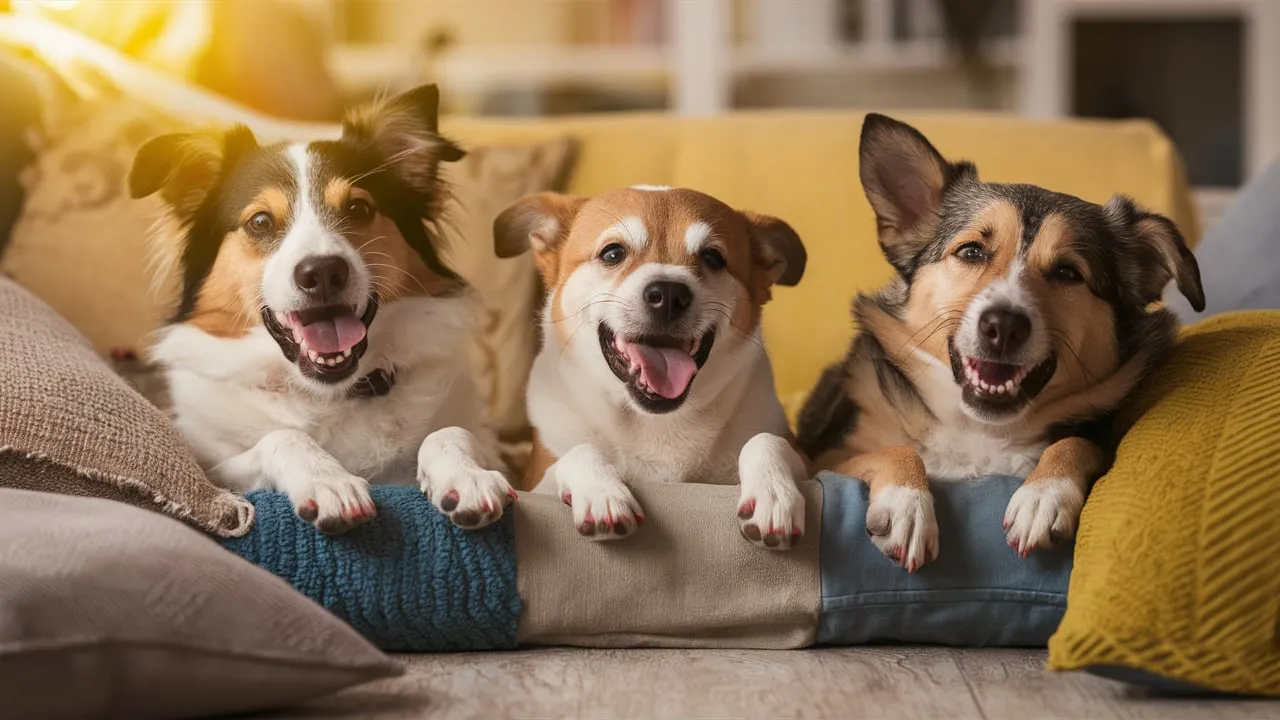Why Do Dogs Lick At Their Paws? Have you ever watched your furry friend intently lick their paws, seemingly lost in a world of self-grooming?
In this article, The Dogs 247 will delve into the common reasons behind paw licking, exploring the potential causes and how to recognize when it’s time to seek veterinary advice.
Why Do Dogs Lick At Their Paws? Common Reasons for Paw Licking
Paw licking is a complex behavior with a range of contributing factors. Let’s explore some of the most common reasons:
Boredom and Anxiety
Just like humans, dogs need mental stimulation. When they’re bored or anxious, they may resort to repetitive behaviors like paw licking. Think of it as a way to self-soothe. If your dog is constantly licking their paws, especially when left alone, it might be a sign of boredom or anxiety.
Allergies and Skin Irritations
Dogs can suffer from allergies to various things like pollen, dust mites, and even certain foods. These allergies can lead to skin irritations, itchiness, and inflammation, prompting your dog to lick their paws for relief.
Infections and Injuries
Paw licking can also be a response to infections or injuries. Cuts, scrapes, or even tiny punctures can cause discomfort, leading your dog to lick the area. Infections, like yeast or bacterial infections, can also trigger excessive licking.
Medical Conditions
In some cases, paw licking can be a symptom of underlying medical conditions. Arthritis, diabetes, and hypothyroidism are just a few examples. These conditions can cause pain, inflammation, or other discomfort that prompts your dog to lick their paws.
Behavioral Issues
Compulsive licking, a form of obsessive-compulsive disorder, can also be a factor. This behavior is often triggered by stress or anxiety, and it can lead to excessive licking that can even damage the paw pads.
Recognizing Excessive Paw Licking
While a little bit of paw licking is normal, excessive licking can be a cause for concern. Here are some signs that might indicate a problem:
- Frequent and Intense Licking: If your dog is constantly licking their paws, even when they seem otherwise healthy, it’s worth paying attention.
- Redness, Swelling, or Bleeding: If you notice redness, swelling, or even bleeding on your dog’s paw pads, it’s a sign of potential injury or infection.
- Licking Until the Skin is Raw: Excessive licking can lead to raw, irritated skin, which can become infected if left untreated.
- Limping or Reluctance to Walk: If your dog is limping or seems reluctant to walk, it could be a sign of pain or discomfort related to their paws.

Addressing Paw Licking
If you notice any of these signs, it’s important to consult with your veterinarian. They can help diagnose the underlying cause of your dog’s paw licking and recommend appropriate treatment.
Here’s what you can expect from your vet:
- Physical Examination: Your vet will perform a thorough physical examination to assess your dog’s overall health and identify any potential issues with their paws.
- Allergy Testing: If allergies are suspected, your vet may recommend allergy testing to identify specific allergens.
- Medical Treatment: Depending on the cause, your vet may prescribe medications to address infections, inflammation, or other medical conditions.
- Behavioral Therapy: If compulsive licking is a concern, your vet may recommend behavioral therapy with a certified dog trainer.
How to Prevent Paw Licking?
While you can’t always prevent paw licking, there are steps you can take to minimize the risk:
- Provide Mental Stimulation: Engage your dog with interactive toys, training sessions, and regular walks to keep them mentally stimulated and reduce boredom.
- Manage Allergies: If your dog has allergies, work with your vet to identify and manage potential allergens.
- Keep Paws Clean and Dry: Clean your dog’s paws regularly, especially after walks or playtime, to remove dirt, debris, and potential irritants.
- Provide Paw Protection: Consider using paw protectors, such as boots or socks, to protect your dog’s paws from injuries or irritants.
When to Seek Veterinary Advice?
It’s important to consult with your veterinarian if you notice any of the following:
- Excessive licking that doesn’t seem to stop
- Redness, swelling, or bleeding on your dog’s paw pads
- Licking until the skin is raw
- Limping or reluctance to walk
Remember: Paw licking is a common behavior in dogs, but it’s important to be aware of the potential causes and to seek veterinary advice if you notice any concerning signs. By understanding the reasons behind paw licking and taking steps to address the issue, you can help ensure your dog’s health and well-being.
FAQs
Is paw licking always a sign of a problem?
No, a little bit of paw licking is normal. However, excessive licking can be a sign of an underlying issue.
What are some common causes of paw licking in dogs?
Common causes include boredom, anxiety, allergies, infections, injuries, and medical conditions.
How can I stop my dog from licking their paws?
The best way to stop paw licking is to address the underlying cause. This may involve providing mental stimulation, managing allergies, seeking veterinary care for infections or injuries, or addressing medical conditions.
When should I take my dog to the vet for paw licking?
You should take your dog to the vet if you notice excessive licking, redness, swelling, bleeding, raw skin, limping, or reluctance to walk.
Conclusion
By understanding the reasons behind paw licking and taking proactive steps to address it, you can help ensure your dog’s health and happiness. Remember, a happy and healthy dog is a cherished companion!

Related Post
What Human Food Can Dogs Eat?
What Are Dog Bones Made Of?
What Are The First Signs Of Hip Dysplasia In Dogs?